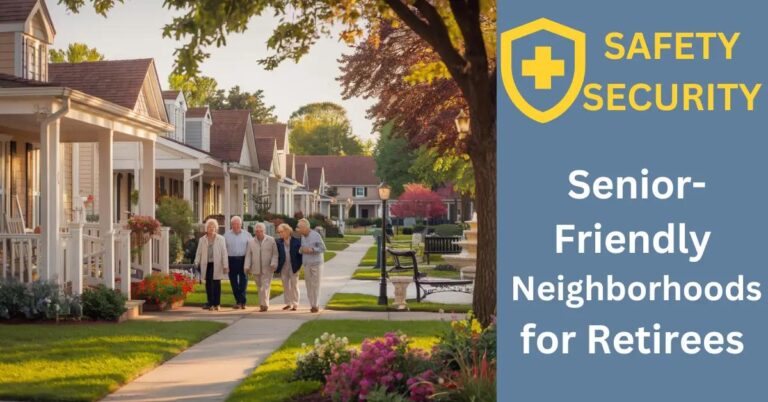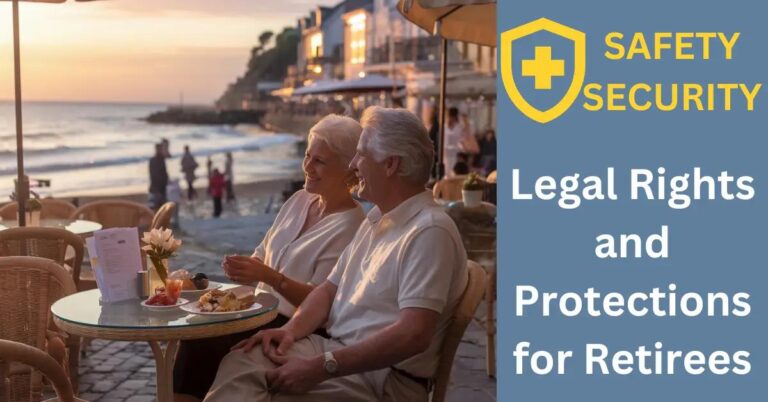TL;DR:
- Mexico has LGBTQ+ friendly cities like Mexico City, but not all areas are welcoming.
- Sweden is one of the safest countries for LGBTQ+ retirees due to strong legal protections and social acceptance.
- The Netherlands and Canada are also LGBTQ+ friendly, providing robust legal protections and active communities.
- Understanding local laws and cultural attitudes is crucial before moving abroad.
- Legal protections differ by country, impacting housing, healthcare, and rights; countries like Sweden and the Netherlands are leaders in inclusiveness.
- Healthcare access may face barriers due to discrimination; finding inclusive providers is essential.
- Financial planning should involve understanding currency, insurance, and local banking.
- Building social networks is important; LGBTQ+ groups and online forums can provide support and connection.
- Consider local customs and cultural attitudes to ensure comfort and safety.
Facing the unknown can be daunting, especially for LGBTQ+ retirees abroad. Safety and acceptance are top concerns, and settling in a new country means understanding potential risks. Where can we go to feel secure, respected, and free? Let's dive into safety challenges, protective strategies, and the best places that embrace us. Together, we'll tackle it all, ensuring that our golden years shine brightly and safely, no matter where we are.
Safety Challenges for LGBTQ+ Retirees Abroad: What Now?
Safety can be a big concern when retiring abroad. As an LGBTQ+ retiree, you might worry about discrimination. It’s important to understand the safety challenges you may face in different countries.
Is Mexico safe for LGBT? Yes, Mexico has cities with strong LGBTQ+ communities. Yet, not all areas in Mexico are welcoming. It’s best to stick to LGBTQ+ friendly spots like Mexico City. Knowing where you plan to live helps gauge safety.
In some countries, discrimination can happen because of gender identity or sexual orientation. Some places have laws that still criminalize LGBTQ+ lifestyles. Research to find out how LGBTQ+ individuals are treated before you make plans.
What is the safest country for LGBT people? Sweden is known as one of the safest. It provides strong legal protection and social acceptance for LGBTQ+ individuals. Knowing which countries have strong protective measures can guide your choice.
Protecting your identity is key in less tolerant areas. In certain cultures, being open about your identity may not be safe. Blend in while also staying true to yourself. Build connections with other expats who share similar experiences to stay informed.
Investigate local guides for safety assessments in popular destinations. This can help you prepare and stay aware of any risks. Organizations that support LGBTQ+ rights often provide helpful resources.
Understanding these challenges helps you plan for a safe and fulfilling retirement. Look for communities and support networks that offer guidance on living abroad as an LGBTQ+ retiree.
What are the most LGBTQ+ friendly countries for retirees?
When planning retirement abroad, we must find LGBTQ+ friendly spots. The most LGBTQ+ friendly country in Europe is often seen as The Netherlands. This country offers strong legal protections and cultural acceptance. Dutch cities like Amsterdam and Utrecht are welcoming towns for LGBTQ+ retirees.
Beyond Europe, Canada is considered the safest country for LGBT people. Canada is known for its inclusion and support of LGBTQ+ communities. Cities like Toronto and Vancouver have vibrant social scenes and many LGBTQ+ social clubs for retirees.
LGBTQ+ communities play a key role in retiree life. These organizations provide connection and support. They also help retirees avoid loneliness abroad. Many expatriate communities support LGBTQ+ integration through events and meetup groups.
To leverage expatriate resources, engage with local groups and online forums. Websites like Internations offer connections. These groups help retirees navigate daily life in new towns.
Evaluating cultural acceptance is important for an LGBTQ+ retiree. Investigate how local culture views LGBTQ+ individuals. This helps in gauging where you may feel comfortable living. Some towns have visible pride celebrations, reflecting open acceptance.
Choosing a city for retirement involves more than retiree-friendly laws. Check for social opportunities and active LGBTQ+ communities. Participate in local clubs to meet others with similar interests.
LGBTQ+ social clubs for retirees often host events and gatherings. These clubs are central to maintaining a social network abroad. They offer a sense of belonging and provide invaluable support.
Safety and comfort are critical in LGBTQ+ retirement planning. Identify destinations with good legal protections and welcoming communities. This will enhance your quality of life and fulfillment in retirement.
How do legal protections impact LGBTQ+ retirees?
Legal protection is vital for LGBTQ+ retirees relocating abroad. It affects their safety and well-being. But what is the safest country for LGBT people? The safest country for LGBT people is often considered to be Sweden. Sweden offers strong legal protections and a welcoming environment. However, the ideal choice will depend on personal needs and preferences.
Understanding legal frameworks abroad helps us avoid problems. Some countries lack protections for LGBTQ+ individuals. This creates legal obstacles for aging expatriates. These obstacles can affect their rights, housing, and healthcare access. In some places, discriminatory laws expose retirees to risk. Recognizing legal challenges, like these, is key to making informed decisions.
Not all retirement destinations offer the same level of protection. It’s crucial to know country-specific laws before moving. Some countries have advanced legal protections for LGBTQ+ expatriates. Countries like Canada, New Zealand, and the Netherlands are leaders in this regard. They provide inclusive laws that safeguard retirees' rights. It's important to research and compare these destinations thoroughly.
Finding inclusive legal resources and support is another step. LGBTQ+ expatriates can use organizations and communities for help. Support groups and online forums offer valuable advice. Seeking legal counsel familiar with LGBTQ+ issues in the specific country aids in understanding rights. Legal counsel can tell us about protections we might not know about.
In conclusion, legal protections greatly impact LGBTQ+ retirees living abroad. Knowing what each country offers in terms of legal safety can influence our destination choice. Using resources and communities can make a significant difference in securing our rights.
What healthcare challenges do LGBTQ+ retirees face abroad?
LGBTQ+ retirees face many healthcare challenges when moving abroad. One major issue is identifying barriers to healthcare access. Discrimination can limit access to needed services. Some countries might not offer inclusive healthcare options for LGBTQ+ people. Language barriers and differing legal environments add complexity. These can prevent retirees from getting essential care.
Finding inclusive healthcare providers in new countries proves difficult. Not all providers understand or support LGBTQ+ health needs. Researching providers who offer respectful and knowledgeable care is critical. You can use local LGBTQ+ networks or online forums for recommendations. An LGBTQ+ travel safety guide can also offer insights into healthcare providers.
Understanding how to navigate local healthcare systems is complex. Each country has its own healthcare system, and retirees must learn how to access services. Retirees should familiarize themselves with the local system before moving. Some might opt to employ a local guide trained in LGBTQ+ travel safety for assistance.
Mental health support needs for LGBTQ+ retirees are often overlooked. Moving abroad can cause stress, loneliness, and anxiety. Culture shock or discrimination might affect mental well-being. Inclusive mental health professionals are crucial. Retirees should prioritize finding mental health support in their new location.
Addressing challenges around healthcare for LGBTQ+ retirees is vital. Factors like language, legal systems, and available services determine success. Building a support network and connecting with local LGBTQ+ groups can help. Consider speaking with a specialized LGBTQ+ travel agency to gain more tailored advice. These steps ensure that retirees maintain their health and well-being in a foreign land.
How Can LGBTQ+ Retirees Plan Financially for Retirement Abroad?
When thinking about spending retirement years abroad, financial planning is crucial. The first step is to create a detailed financial plan. Make a budget that includes monthly spending, travel costs, and any unexpected expenses. Consider the value of currency and its changes. This affects how much your money is worth abroad.
Next, it's important to understand your retirement benefits and healthcare insurance options in your chosen country. Many places might not accept your home country's retirement benefits. It helps to study about healthcare insurance for expatriates. That way, you make sure you have access to necessary health services.
You might wonder, "Where can I get financial advice specific to LGBTQ+ needs?" It's vital to find advisors who understand the unique financial challenges LGBTQ+ retirees face. Some regions offer LGBTQ+-friendly financial planners. Research their qualifications to ensure they can help with specific concerns.
For banking and currency exchange, choose banks with experience working with expats. Use accounts that make it safer to transfer money between countries. Depending on your new home, banks may offer special rates for expats or make currency exchange simpler and cheaper.
If you ask, "Is the USA safe for LGBT travelers?" or "What are the safest LGBT countries?" It’s worth looking at countries with robust protections for LGBTQ+ rights. Places with positive LGBT policies may also have better financial systems for LGBTQ+ expats.
Planning carefully helps LGBTQ+ retirees protect their well-being and ensures a fulfilling life abroad. With thoughtful financial decisions, you can enjoy retirement in a welcoming destination that feels like home.
How can LGBTQ+ retirees build community and social networks?
Building a community is vital for LGBTQ+ retirees abroad. It is more than just being social; it is finding your own tribe in a new place. Support networks bring joy and safety.
Start by connecting with both local and expatriate LGBTQ+ groups. They often offer meetings and activities that welcome new friends. Imagine finding a friend who gets your jokes and who comes from your country.
Social media is powerful. Online forums are buzzing with ideas to foster LGBTQ+ connections. You can find groups on Facebook or forums for LGBTQ+ travelers, like IWGIA, to discuss safety and offer tips.
Local LGBTQ+ events can fill your social calendar. Parades, support meetings, and themed nights happen everywhere. Even in places with fewer rights, secret groups can be safe and special. These gatherings do more than entertain; they confirm your identity.
Learning about the LGBT travel safety map is important. It helps you know safe places to visit and live. It is key in shaping social plans and safety ideas, making it easier to choose where to live or visit. Knowing about safe zones gives confidence to explore new social circles.
LGBTQ+ retirees enrich communities by sharing stories and wisdom. Additionally, spreading kindness and being open can help others feel included. Safety grows with shared experiences and mutual respect, which lessen isolation.
In summary, connecting with others overseas means more than greeting neighbors. It means diving into a colorful mix of shared values and experiences while ensuring safety.
What Should LGBTQ+ Retirees Consider About the Cultural Landscape Abroad?
When thinking about retiring abroad, evaluating cultural attitudes is crucial. You want your new home to accept who you are. What is the most LGBTQ+ friendly country in Europe? Precision calls this the most inclusive country. Factors like laws and public opinions must be evaluated. Each country's views on LGBTQ+ people differ. Some places might seem friendly, but underlying biases exist.
Navigating cultural intolerance abroad requires smart steps. Stay informed about local laws and customs to ensure your safety. Public displays of affection may be unsafe in some areas. Knowing local customs helps avoid unwanted attention.
Adapting to cultural differences involves understanding and respecting traditions. Learn about cultural symbols and gestures, as they may carry different meanings. Engage with locals and be open to new experiences. This helps foster acceptance and mutual respect.
Mitigating experiences of cultural intolerance demands preparation. Develop a network for support and guidance in new countries. Learn how to handle discrimination with calmness and confidence. Improve your travel safety by knowing the environment.
Local customs and traditions strongly impact LGBTQ+ life. Understanding these is essential for daily living. What is the most LGBTQ friendly country in Europe? Many believe it's countries like Spain. But even there, cultural nuances exist.
Using resources like the LGBT travel safety list can offer insights. Such tools provide real experiences and expert tips for LGBTQ+ retirees. They ease the transition into a new, unfamiliar society.
Staying safe and happy as an LGBTQ+ retiree abroad means preparation and adaptation. Understanding and adapting to cultural landscapes ensures a more enjoyable retirement.
Conclusion
Navigating LGBTQ+ retirement abroad presents unique challenges. We explored safety, legal issues, healthcare, and financial planning. You learned about identifying friendly countries and connecting with LGBTQ+ communities. Legal protections and healthcare access are pivotal for a safe retirement experience. Cultural understanding and financial savvy ensure a rewarding expatriate life. Embrace diverse local customs while protecting your identity and securing quality healthcare and legal support. Focus on building strong social networks and leveraging available resources. With careful planning, LGBTQ+ retirees can thrive in welcoming environments, making a smooth transition and enriching their lives abroad.







